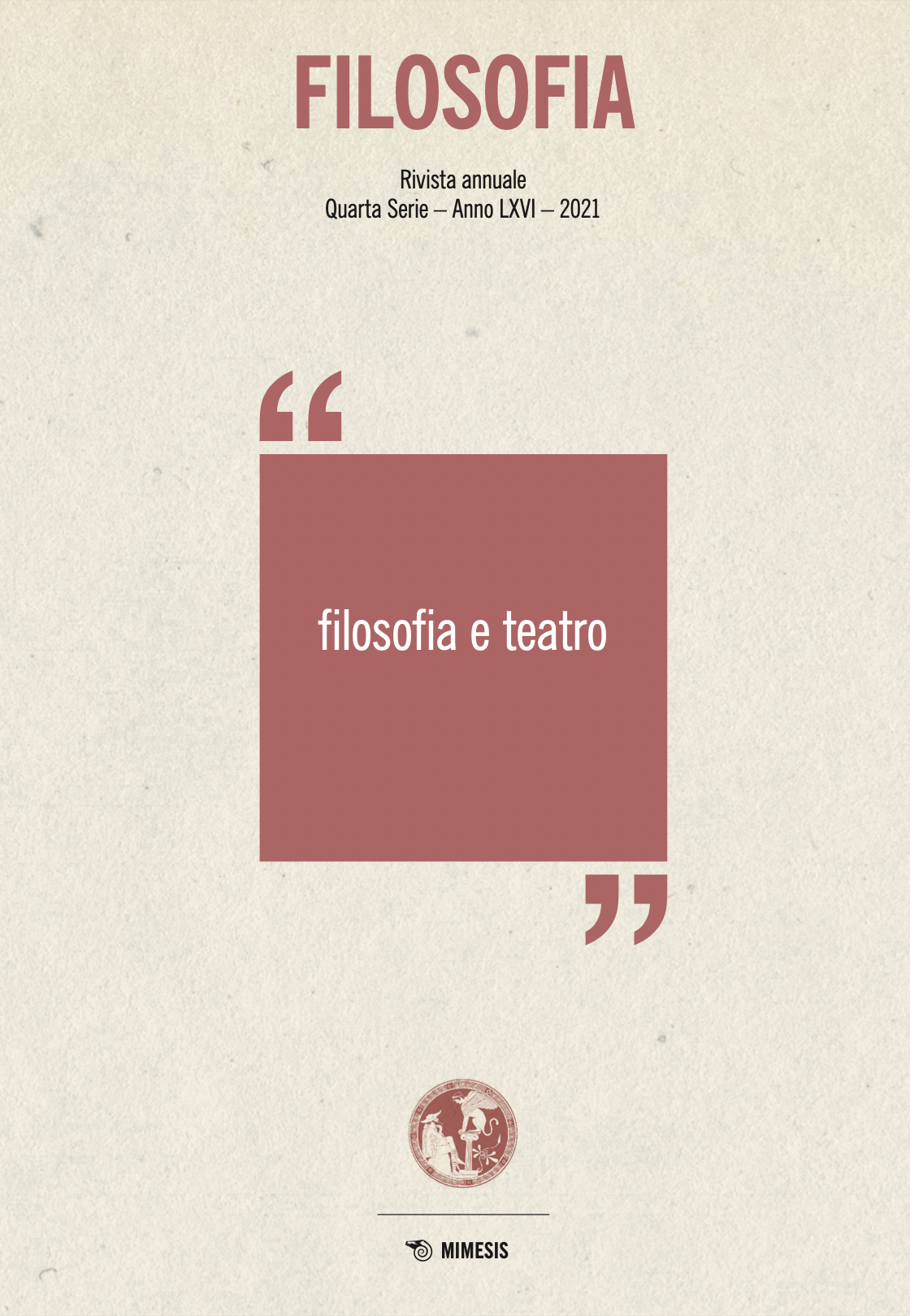"Is the rest silence?". Modern Tragic in Hamlet and Carl Schmitt's Theory
DOI:
https://doi.org/10.13135/2704-8195/6275Keywords:
Hamlet or Hecuba, Hamlet, secularisation, political theology, katéchonAbstract
The article focuses on two main issues of Carl Schmitt’s Hamlet or Hecuba: the “intrusion” of historical reality into the play as source of the tragic, and the meaning of “modern tragic” in the book. A reading of Schmitt’s position in these regards is proposed against that of other critics and verified by a textual analysis of Hamlet. The modern tragic elements in Shakespeare’s text are made explicit and compared with Schmitt’s view on the tragic derived from his œuvre. Finally, an exhortation to overcoming the tragic impasse is identified in Hamlet or Hecuba and explained through Schmitt’s past works. Thereby, an aspect of Schmitt’s thought is pinpointed that sets it apart from Shakespeare’s play and exceeds its tragic conclusion.
Downloads
References
Becchi, Paolo. 1997. “Carl Schmitt e il ‘tabù della regina’”. Nuova corrente 44, n. 119: 55-80.
Benjamin, Walter. 2001. Il dramma barocco tedesco in Opere complete di Walter Benjamin, vol. II, Scritti 1923-1927. Ed. it. Enrico Ganni. Torino: Giulio Einaudi.
Borkenau, Franz. 1984. La transizione dall’immagine feudale all’immagine borghese del mondo. La filosofia del periodo della manifattura. Tr. it. Antonella Bonacchi, ed. it. Giacomo Marramao. Bologna: Il Mulino.
Cacciari, Massimo. 1987. “Intransitabili utopie” in Hugo von Hofmannsthal. La torre. Tr. it. Silvia Bortoli Cappelletto. Milano: Adelphi.
Ciocca, Rossella. 1987. Il cerchio d’oro; i Re sacri nel teatro shakespeariano. Roma: Officina Edizioni.
Dover Wilson, John. 1935. What Happens in Hamlet. Cambridge: Cambridge University Press.
Edwards, Philip. 2016. “Introduction” and notes in William Shakespeare. Hamlet, Prince of Denmark. Philip Edwards, ed. New York: Cambridge University Press.
Foucault, Michel. 2018. Le parole e le cose. Tr. it. Emilio Panaitescu. Milano: Mondadori.
Galli, Carlo. 2010. “Carl Schmitt nella cultura italiana (1924-1978). Storia, bilancio, prospettive di una presenza problematica”. Storicamente 6, art. n. 11. DOI: 10.1473/stor86.
Galli, Carlo. 2010 (2). Genealogia della politica. Carl Schmitt e la crisi del pensiero politico moderno. Bologna: Il Mulino.
Galli, Carlo. 2012. “Presentazione; il trauma dell’indecisione” in Carl Schmitt. 2012. Amleto o Ecuba. Ed. it. Carlo Galli, 7-35. Bologna: Il Mulino.
Galli, Carlo. 2012 (2). “Hamlet: Representation and the Concrete”. In Political Theology and Early Modernity. Graham Hammill and Julia Reinhard Lupton, eds., 60-83. Chicago and London: The University of Chicago Press.
Gatti, Hilary. 2013. The Renaissance Drama of Knowledge: Giordano Bruno in England. New York: Routledge.
Hadfield, Andrew. 2004. Shakespeare and Renaissance Politics. London: Arden Shakespeare.
Höfele, Andreas. 2016. “Hamlet in Plettenberg: Carl Schmitt and the Intrusion of the Time” in No Hamlets. German Shakespeare from Nietzsche to Carl Schmitt. Oxford: Oxford University Press.
James, D. G. 1951. “The New Doubt” in The Dream of Learning. Oxford: Clarendon Press, 33-68.
Kahn, Victoria. 2003. “Hamlet or Hecuba: Carl Schmitt’s Decision”. Representations 83, n. 1: 67-96.
Kahn, Victoria. 2014. The Future of Illusion: Political Theology and Early Modern Texts. Chicago: The University of Chicago Press.
Kantorowicz, Ernst H. 2012. I due corpi del re. L’idea di regalità nella teologica politica medievale. Tr. it. Giovanni Rizzoni. Torino: Einaudi.
Koyré, Alexandre. 1981. Dal mondo chiuso all’universo infinito. Tr. it. Luca Cafiero. Milano: Feltrinelli.
Lanzen Harris, Laurie, and Mark W. Scott, eds. 1984. “Hamlet”, in Shakespearean criticism. Detroit: Gale Research Company, 70-281.
Maraviglia, Massimo. 2006. La penultima guerra; Il “katéchon” nella dottrina dell’ordine politico di Carl Schmitt. Milano: LED.
Moretti, Franco. 1979. “La grande eclissi. Forma tragica e sconsacrazione della sovranità”. Calibano 1979, n. 4: 9-52.
Nicoletti, Michele. 1990. Trascendenza e potere. La Teologia politica di Carl Schmitt. Brescia: Morcelliana.
Nuttall, Anthony David. 2008. Shakespeare the Thinker. New Haven: Yale University Press.
Ojakangas, Mika. 2009. “Carl Schmitt and the Sacred Origins of Law”. Telos 147, n. 2: 34-54.
Rust, Jennifer R., and Julia Lupton. 2009. “Introduction: Schmitt and Shakespeare”, in Carl Schmitt. Hamlet or Hecuba. David Pan and Jennifer R. Rust, eds. New York: Telos Press Publishing.
Salvatore, Andrea. 2012. “The Tragic Theory of Carl Schmitt”. Telos 161, n. 4: 181-87.
Scattola, Merio. 2003. Dalla virtù alla scienza. La fondazione e la trasformazione della disciplina politica nell’età moderna. Milano: Franco Angeli.
Schmitt, Carl. 1929. L’epoca delle neutralizzazioni e delle spoliticizzazioni in Le categorie del ‘politico’. Ed. it. Pierangelo Schiera e Gianfranco Miglio. 1972. Bologna: Il Mulino.
Schmitt, Carl. 1959. “Nomos – presa di possesso – nome” in Carl Schmitt. 2015. Stato, grande spazio, nomos. Günter Maschke, a cura di. Ed. it. Giovanni Gurisatti. Milano: Adelphi.
Schmitt, Carl. 1972. Le categorie del ‘politico’. Ed. it. Pierangelo Schiera e Gianfranco Miglio. Bologna: Il Mulino.
Schmitt, Carl. 1991. Il Nomos della terra. Tr. it. Emanuele Castrucci, ed. it. Franco Volpi. Milano: Adelphi.
Schmitt, Carl. 2001. Glossario. Ed. it. Petra Dal Santo. Milano: Giuffrè.
Schmitt, Carl. 2005. Ex Captivitate Salus. Tr. it. Carlo Mainoldi. Milano: Adelphi.
Schmitt, Carl. 2010. Cattolicesimo romano e forma politica. Tr. e ed. it. Carlo Galli. Bologna: Il Mulino.
Schmitt, Carl. 2010 (2). “Foreword to the German Edition of Lilian Winstanley’s Hamlet and the Scottish Succession”. Telos 153, n. 4: 164-77.
Schmitt, Carl. 2011. Sul Leviatano. Ed. it. Carlo Galli. Bologna: Il Mulino.
Schmitt, Carl. 2012. Amleto o Ecuba. Ed. it. Carlo Galli. Bologna: Il Mulino.
Serpieri, Alessandro. 1986. “Macbeth: il tempo della paura” in Retorica e immaginario. Alessandro Serpieri, a cura di, 193-266. Parma: Pratiche.
Serpieri, Alessandro. 1997. “La tragedia dell’essere” in William Shakespeare. Amleto. Tr. e ed. it. Alessandro Serpieri. Venezia: Marsilio.
Shakespeare, William. 1599-1602. Hamlet. Ann Thompson and Neil Taylor, eds. 2016. London: The Arden Shakespeare.
Skinner, Quentin. 1978. The Foundations of Modern Political Thought. Volume two: The Age of Reformation. Cambridge: Cambridge University Press.
King James VI and I. 1994. Political Writings. Johann P. Sommerville, ed. Cambridge: Cambridge University Press.
Strathausen, Carsten. 2010. “Myth or Knowledge? Reading Carl Schmitt’s Hamlet or Hecuba”. Telos 153, n. 4: 7-29.
Williams, Rowan. 2016. The Tragic Imagination. Oxford: Oxford University Press.
Winstanley, Lilian. 1921. Hamlet and the Scottish Succession. Cambridge: Cambridge University Press.



